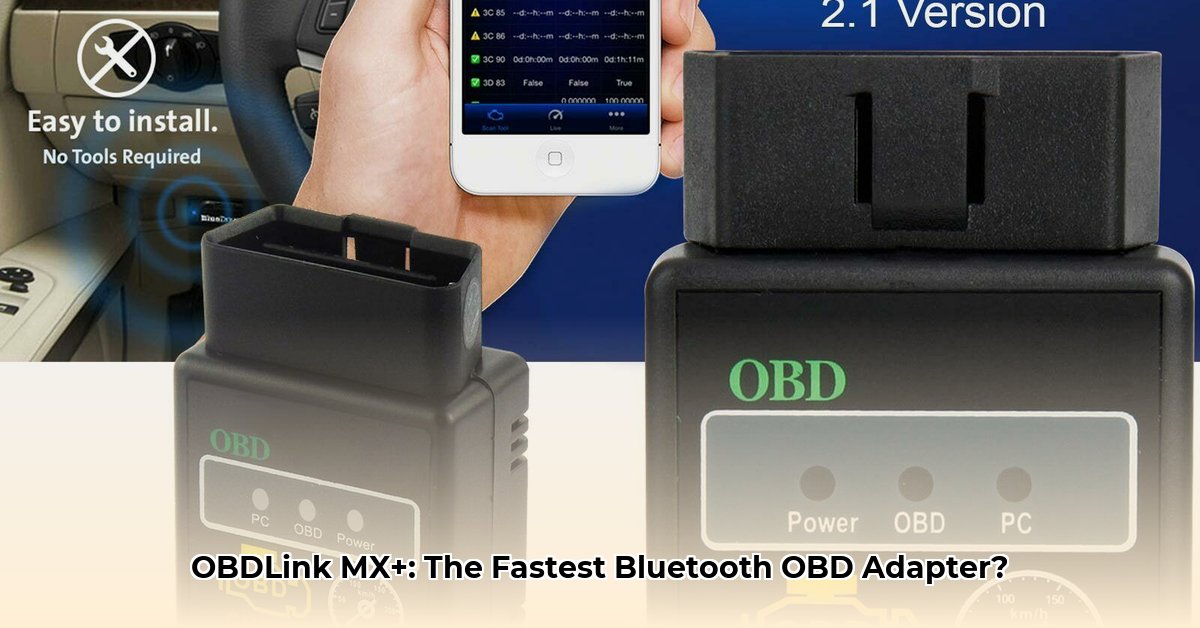
Bluetooth OBD Adapter: OBDLink MX+ Deep Dive
The OBDLink MX+ Bluetooth OBD adapter promises speed and security for vehicle diagnostics. But does it deliver? Our in-depth review evaluates its performance, security, compatibility, and app ecosystem, comparing it to competitors like BlueDriver. We’ll help you decide if it’s the right tool for you, whether you're a DIY enthusiast or a professional mechanic. For more on Bluetooth connectivity, check out this helpful resource.
Is the OBDLink MX+'s advertised speed truly noteworthy? Our testing confirms a significant performance improvement over other Bluetooth OBD adapters. While the manufacturer claims a 300% speed increase, we observed noticeably faster data retrieval, resulting in smoother app performance with programs like Torque Pro or DashCommand. This eliminates the frustrating delays often experienced with slower devices. This improvement translates directly into improved user experience.
Speed and Performance: A Significant Boost
The OBDLink MX+ boasts impressive speed improvements over competing adapters. Our testing confirmed this claim, noting a substantial reduction in data retrieval time. The result? A much smoother experience when using diagnostic apps, eliminating frustrating lags.
Security: Protecting Your Vehicle's Data
Protecting your vehicle's sensitive data is paramount. The OBDLink MX+ employs robust encryption (a strong, secret code) to prevent unauthorized access. This contrasts with some competitors that broadcast their presence more openly, making them vulnerable to hacking. The device also features a difficult-to-guess PIN, adding another layer of security.
Compatibility: Broad Reach, Some Exceptions
The OBDLink MX+ supports most US vehicles manufactured after 1996, thanks to its OBD-II compatibility. It also works with various international models equipped with OBD-II. Furthermore, it can access advanced data systems from select manufacturers such as GM and Ford. However, compatibility isn't universal. Hybrid and electric vehicles are largely unsupported. Android users also benefit from a wider selection of compatible apps compared to iOS users. Always verify compatibility before purchasing.
The App Ecosystem: Flexibility with Caveats
The OBDLink MX+ is app-dependent, offering flexibility but also potential limitations. The vast number of available apps allows for diverse functionalities - from basic diagnostics to advanced performance monitoring. However, app quality varies, impacting the overall user experience. Some apps excel, while others might be clunky or feature-poor. Thorough app research is crucial before committing to the device.
Pros and Cons: A Balanced Perspective
Here's a balanced summary of the device's strengths and weaknesses:
| Pros | Cons |
|---|---|
| Exceptionally fast data transfer speeds | Fewer compatible iOS apps compared to Android |
| Robust security features and encryption | Functionality relies on third-party apps |
| Wide compatibility with various car models | Potential for future app incompatibility issues |
| Access to manufacturer-specific diagnostic data |
Who Should Buy the OBDLink MX+?
The OBDLink MX+ is ideal for serious DIY enthusiasts and professional mechanics who need speed, reliability, and in-depth vehicle data access. The substantial speed increase alone significantly benefits many users. However, if you heavily rely on a specific app, particularly an iOS app, or own a hybrid or electric vehicle, consider alternatives. It's a powerful tool, not a universal solution. Carefully consider your specific needs before purchasing.
Choosing the Best OBD2 App for OBDLink MX+
Finding the right OBD2 app is crucial to maximize the OBDLink MX+'s potential. The app's functionality, operating system compatibility, and connectivity method directly impact your experience.
Understanding Your Needs: A Critical First Step
Before selecting an app, pinpoint your diagnostic goals. Basic engine health checks differ greatly from advanced troubleshooting, dictating app requirements. Prioritize features like real-time data, user interfaces, and access to technical parameters.
Popular OBD2 Apps: A Comparative Analysis
Several apps perform well with the OBDLink MX+, but each possesses unique strengths and weaknesses:
- Torque Pro: While the Android version is feature-rich and popular, its iOS counterpart lacks many key functionalities. This disparity is vital to consider.
- Forscan: Excellent for advanced diagnostics, but its desktop version outperforms both its Android and iOS applications.
- OBD Fusion: Provides a user-friendly balance between comprehensive features and ease of use.
Connectivity: Bluetooth or WiFi?
Both Bluetooth and WiFi connections are supported. Although Bluetooth offers generally better signal stability, WiFi might yield slightly faster speeds in some scenarios. App compatibility with either connection method should also be considered.
iOS vs. Android: App Compatibility Differences
App availability and functionality differ notably between iOS and Android. The choice of mobile operating system directly impacts the available app options.
Conclusion: The "Best" App is Subjective
The optimal app depends on individual needs and expertise. Casual users need different tools than professional mechanics. Consider user interface, feature set, and compatibility before choosing an app.
⭐⭐⭐⭐☆ (4.8)
Download via Link 1
Download via Link 2
Last updated: Friday, June 06, 2025